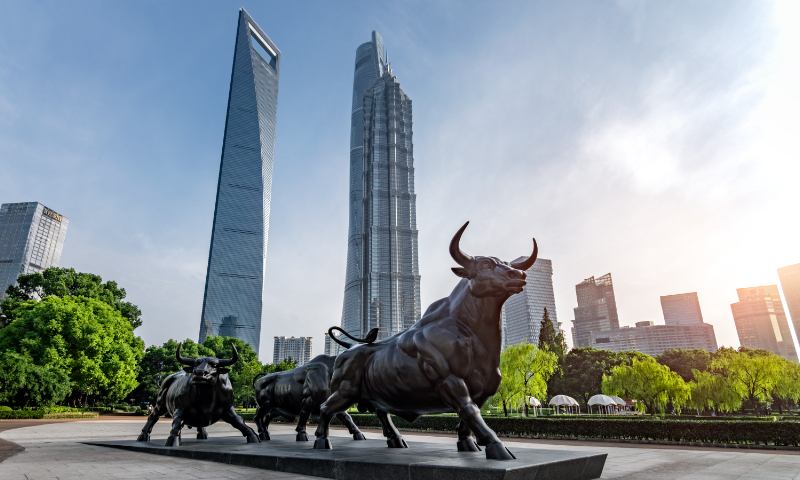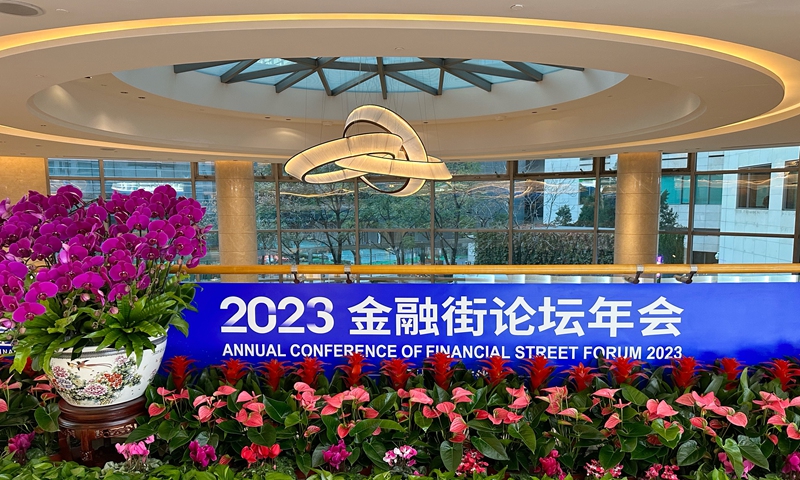China remains popular destination for foreign investment, thanks to its great growth potential: DBS executive

Aerial view of Shanghai Photo: VCG
Editor's Note:
The 15th Lujiazui Forum kicked off in Shanghai on Wednesday. During the forum, Chinese financial regulators announced a raft of policy measures and reform measures for China's capital market and highlighted China's efforts in promoting high-quality opening-up in the financial sector. Where will China's capital market reform lead and what opportunities are there for foreign financial institutions? The Global Times (GT) reporter Ma Jingjing interviewed Ginger Cheng (Cheng), CEO of DBS China, about China's economic development, financial opening up, and other topics.
GT: DBS revised up China's GDP growth forecast for 2024 to 5 percent in April. How do you view China's economic prospects?
Cheng: China's GDP growth of 5.3 percent year-on-year in the first quarter comfortably topped forecasts. The economy grew faster than expected in the first quarter. Domestic demand within China has been strengthening, with consumer spending and investment both picking up. This provides an important driver for continued economic expansion.
China's integration with the global economy remains a key engine, with trade and investment flows continuing to grow, especially with major partners like the ASEAN region.
State-led investment is playing a vital role in supporting the economy. Investment into strategic sectors such as electric vehicle (EV), advanced manufacturing, tech hardware and artificial intelligence will help offset the shortfall of property investment. Fiscal stimulus through infrastructure investment will offset the shortfall of property investment. With the stable and improving performance of the economy in the Chinese mainland, as well as the continued prosperity of the offshore market, the demand for using the yuan as a currency for international trade settlement and trade financing is expected to gradually increase.

Ginger Cheng, CEO of DBS China Photo: Courtesy of DBS China
GT: What opportunities will China's financial opening-up bring for DBS? And, what's the bank's development strategy in the market?
Cheng: In the past 30 years, DBS has benefited greatly from the opening-up policy of China's financial market, and DBS China is positioned to participate deeply in the development of China's financial market, coordinating the resources and network of DBS Group in the global region to provide differentiated financial support for the development of China's new quality productive forces.
We have been keeping pace with times, empowering the real economy with high-quality financial services, deeply participating in the opening-up of China's financial market, and giving full play to our own expertise. At the same time, we actively participate in the development of various important economic regions of the country, including Shanghai and the Yangtze River Delta region, the Guangdong-Hong Kong-Macao Greater Bay Area, Chongqing and the western region. Earlier this year, DBS China received a license from China's National Association of Financial Market Institutional Investors to underwrite debt financing instruments for non-financial enterprises, including foreign issuers, in the China Interbank Bond Market, becoming the first Southeast Asia-headquartered bank to secure this license.
GT: Over recent years, the Chinese mainland has intensified measures to consolidate Hong Kong's role as an international financial center. What is the status of DBS' investment in the Guangdong-Hong Kong-Macao Greater Bay Area (GBA) and what is your opinion on Hong Kong's standing in the global economy?
Cheng: DBS' commitment to the region is part of a long-term plan to increase the depth of its partnership with Chinese businesses. DBS has been a significant player in the GBA, actively integrating, investing in, and implementing its development and growth strategies. Our income generated from large companies in the region since our launch of a five-year development plan in 2018 has increased by 30 percent, while that from small and medium-sized enterprises has doubled. To capture the full potential of GBA, DBS Group has further increased its stake in Shenzhen Rural Commercial Bank to 16.69 percent by end of 2023.
Being the most international city in the GBA, Hong Kong continues to be a key engine for regional development. With the steady economic growth in the Chinese mainland and the opportunities created by the ongoing development of the GBA, Hong Kong is well-placed to play the role as a "super connector" and "super value-adder", proactively take forward the development of the GBA.
Despite the highly uncertain external environment, Hong Kong continues to be one of the leading international financial centers and a world-class wealth management hub. Capitalizing on advantages presented by both the mainland and the international communities, Hong Kong serves as the bridge connecting China and the rest of the world. It is also the springboard for overseas enterprises to access the huge mainland market and for mainland enterprises to go global.
GT: The yuan has become a major global currency after years of ongoing internationalization. What is your view on the yuan's potential amid growing geopolitical tensions and trade protectionism?
Cheng: From our bank's perspective, global yuan settlement and yuan financing have gained significant momentum. DBS China is one of the first banks to participate in the yuan Cross-border Interbank Payment System (CIPS). As of March 2024, DBS China's CIPS business transaction volume has increased by 67 percent year-on-year, ranking as the best amongst foreign banks. DBS is one of the most involved foreign banks in the financial institutions Panda bond market. Panda bonds are yuan-denominated debts sold by overseas issuers to meet financing demand. In the longer term, the yuan will steadily and solidly develop into one of the major international currencies, and strive to play a leading role in regions such as East Asia, Southeast Asia, and countries and markets along the Belt and Road Initiative.
GT: For some time, there have been reports and comments in Western media outlets hyping "China peak" rhetoric and claims of "foreign capital fleeing China." What is your perspective on this?
Cheng: With China's steady economic growth, the country remains a popular destination for foreign investment, especially in technology innovation, energy transition, pharmaceutical sector, and consumer goods area. The way we look at determinants of long-term growth potential is through the lens of innovation. When we look at the kind of investment China is doing, in educating its population, providing it with skills for the next round of technological waves, as well as the output by Chinese scientists, we are encouraged for the long-term potential of China.
What we see in China, particularly in the area related with green transition, solar, wind, battery, EV, is tremendous competition between companies, provinces, and that creates drive for efficiency, cost reduction and improving quality and services offered to customers. That to us is the most important thing after doing innovation, putting the innovation into place and creating commercialized application of the innovation in a cost-efficient manner. There are some sectors where there is still tremendous attractiveness for foreign investors, for example, the pharmaceutical sector. Chinese consumers, their scale and their purchasing capacity, are a huge draw for global consumer goods producers and global producers of food and beverages services.



